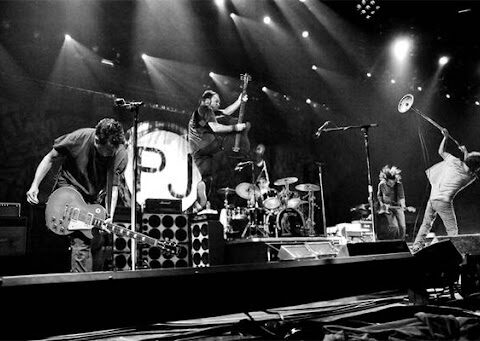It may have become a little cliched to wax lyrical about the late Amy Winehouse and her talent; I’ve done it once or twice here too.
But it was recently the ten-year anniversary of her monumental album, Back To Black, so this is more a reflection on that album than on Amy herself – though admittedly it it quite difficult to separate the two subjects, as so much of her popular identity is tied up in this particular piece of work.
I will say this: to my mind, Back To Black is arguably the greatest individual album released in the 21st century so far. I said arguably.
To my thinking, what isn’t arguable is that it is the most standout album of the last fifteen years or so.
That is to say, when I try to cast my thought back over all the popular music of the last fifteen years, there is very little that jumps out as being memorable, unique or even just outstanding. And those that do tend to be works by established artists (PJ Harvey or Bjork, for example) – in other words, artists who’d already crafted out their careers in the nineties or eighties and happened to also produce a good album or two in this past decade.
But as far as new or breakthrough artists go, the last fifteen years or so haven’t yielded much of great substance or character.
In that context, Amy’s second album stands out like a fully decorated Christmas tree in a swamp.
At that time when the album was gathering profile, I was already well into a stage where I’d become very jaded about popular music and my interest levels in contemporary music scenes was at a low. In the ten years since then, I haven’t necessarily improved on that too much. And I hadn’t been particularly interested in Amy’s first album, Frank – so, no, I wasn’t one of those early fans (I even, lazily, turned down the chance to watch her in a tiny cafe back in the earlyish days, which I lamented over here).
It was when I saw the second single, ‘You Know I’m No Good’, on TV that I was hooked in. Some of the allure was in Amy herself – by now, fully reinvented in her new, iconic image, with the bee-hive hair and the delicate, slightly off-balance stage persona. But more than that, it was just the music. That song in particular still remains my favorite song of hers, and possibly my favorite single of this century so far.
With its rich, soul-dripping vocals, savvy, laconic lyrics, and knowing, refrained use of horns, it is both an example of sublime, measured songwriting and measured, clever production.
The song structure is really very sparse and basic – which is sufficient, because Amy’s voice can carry the burden. But it’s also about the subtlety; what Mark Ronson and the production did was to use the extra instruments very sparingly but to put them in the perfect place. Ronson later said that he had tried to keep the production sparse to avoid the songs feeling ‘overproduced’.
It is also, of course, just a brilliant song too, which sounded modern but also sounded very much like something from the sixties. That same sense of evoking the past and speaking to the present also permeates the entire album and imbues it all with a timeless quality. This isn’t by accident, as Amy herself said she was trying in part to evoke the girl groups of the fifties and sixties – something that clearly didn’t just influence the music but also her look and style.
My personal experience of this album was that I was in a place where I hadn’t been listening to much contemporary pop for some time and was very switched off. Lauryn Hill was, at that time, the closest I had gotten in ages to listening to popular artists – for the most part, at that time, I was still predominately listening to The Doors and stuff like Babes in Toyland. Back to Black was the first album in several years that I had properly gotten into and that had properly felt like a moment in time.
It helped, of course, that Amy had turned herself into such an iconic looking, seeming and feeling persona that you immediately felt like you were catching something special happening.

But all of that would’ve counted for very little if the music itself had failed to deliver anything of substance. Instead, what we got was a stunning, perfect body of music. A sublime collection of perfectly-measured songs that drew on and evoked so much that it really should’ve been beyond the capabilities of someone as young as Amy was at this time.
‘Rehab’, for example, was a very contemporary feeling song that you couldn’t really imagine being released in an earlier era; yet it also feels retro at the same time. And what is ‘Rehab’? Pop? Jazz? Funk? It was whatever it was; it’s own thing. Just as Amy was her own thing and what she was doing was her own thing. What it clearly wasn’t was something designed to be contemporary, but to exist on its own.
Which might be part of why it resonated so potently: much of the very best music consists of artists trying to re-process music and influences from the past through their own, contemporary blender or perspective.
What you get from that, at the best of times, is something distinctive and unique-feeling, both retro and contemporary, and nothing exemplifies this process better or more clearly than Back to Black.
And there’s not a dud track on the record. Every track could’ve been a single. And while the singles, ‘Rehab’, ‘You Know I’m No Good’ and ‘Back to Black’ in particular, tend to be picked out for particular attention, later tracks like ‘He Can Only Hold Her’ and ‘Some Unholy War’ are the (slightly) hidden wonders that get you on second or third listen.
‘He Can Only Hold Her’ should’ve been a single too, and is probably my personal favorite after ‘You Know I’m No Good’. It’s such a simple composition, but is so beautifully delivered and breezes along at such a dreamy, laconic pace, not even trying to do anything clever or climactic, but simply being content in its own space.
The sax and instrumentation of ‘Just Friends’ elevates it from simple soul/pop to breezy jazz, but with a reggae time signature and lilt.
The track ‘Back to Black’ itself is a thing of dark soul/pop genius – the kind of composition and songwriting that singers like Adele and various others will probably go their entire careers without being able to compete with.
It’s a song that, like most of the album, is grounded in sixties Motown style; but it has so much of Amy’s personal soul and aura in it that it can never really be covered or replicated (though it has been covered more times than I can remember, as well as danced to by ‘celebrities’ on a TV dance/talent show – all of which induces the spiritual equivalent of pizza vomit; though Beyonce managed a half passable version of it).
It feels like a funeral march – which is obviously how she envisioned it too, given the moody, funeral music video that accompanied the single.
‘Love is a Losing Game’ was always, to me, the least interesting song on the album – and is actually too sad to listen to – but when you’re saying the least outstanding track on an album is actually a note-perfect pop love song, then it must be one hell of an album.
And ‘Tears Dry On Their Own’, while another obvious Motown homage, is such a blast of positive energy that it always comes as a welcome tone change, being positioned where it is – right after the bleakness of ‘Back to Black’ and ‘Losing Game’.
But it’s the often not-talked-about ‘Wake Up Alone’ that really resonates beautifully: the song isn’t just gorgeous, dripping in Amy’s half bittersweet half optimistic-feeling vocals, but draws you into its space like a deeply personal story book. It’s this, ‘He Can Only Hold Her’ and ‘You Know I’m No Good’ that I always found myself most listening to as individual tracks whenever I didn’t feel like hearing the whole album.
But really, trying to single out a ‘best track’ on this record is fruitless, as every track is gold – and moreover, the whole entity lives and breathes together as one, like most of the best albums in music history do, feeling not like a collection of different tracks but the one multi-track entity.
My only additional wish is that the ‘Valerie’ cover had been recorded at a time that might’ve had it appear on this record, or that the cover of Marvin Gaye’s ‘Through the Grapevine’ that she did with Jools Holland and Paul Weller in the 2006 Annual Hootenanny had been a recorded as an album track. Having said that, maybe it is ultimately better that there are no covers on this record: and that the entire thing is wholly and purely Amy’s work and acts, as it does, as the perpetual monument to her singular talent and style.
It is a stunning, compelling album in every sense.
And it sounds as fresh and potent now as it did ten years ago. If I had to try to compile a list of what I think are the best albums of my lifetime (which is just over thirty years), Back To Black would certainly have to be near the top five or six items on the list.
Where Amy would’ve gone musically from here is anyone’s guess; but it’s difficult to imagine how she could’ve done anything as perfect, as sublime, as this again.




